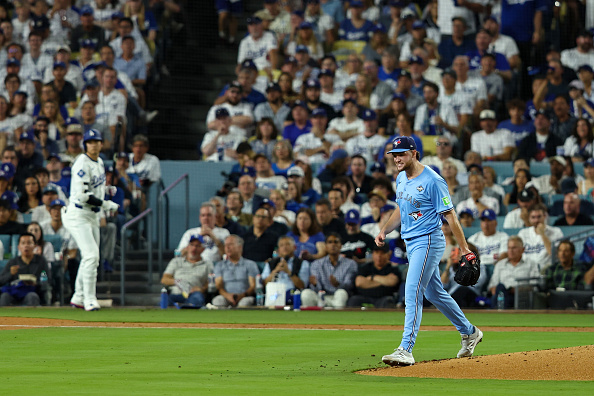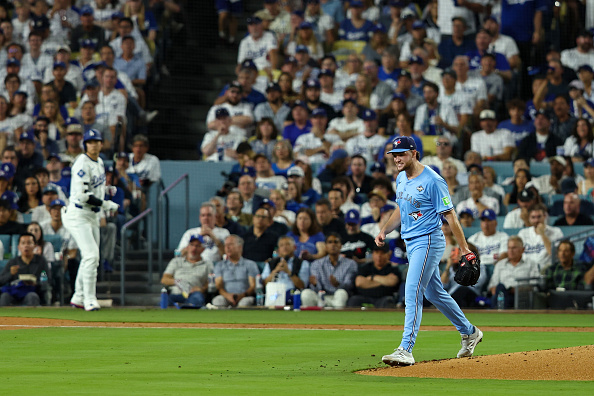
The night began with the roar of 56,000 voices echoing across Chavez Ravine, each one believing this was the game that would tilt the World Series back toward Los Angeles. But before the crowd could even settle into their seats, before the scent of Dodger Dogs had even wafted fully through the aisles, the air was punched out of the stadium by two swings of a bat.
The Toronto Blue Jays hit back-to-back home runs to start Game 5 of the World Series and they would never look back, defeating the Los Angeles Dodgers 6-1 to put them one win away from winning their first championship in 32 years.
Davis Schneider didn’t wait for drama — he created it. On the very first pitch of the game, he turned on a Blake Snell fastball and launched it into the left-field pavilion. One pitch, one run, one stunned silence.
Then came Vladimir Guerrero Jr. — the heartbeat of this Toronto lineup and the face of a generation learning how to wield thunder. He swung with a kind of conviction that only history can inspire, sending Snell’s next fastball into the Dodgers bullpen.
Back-to-back home runs to open a World Series game — a first in baseball’s grand October ledger. And just like that, the Blue Jays led 2–0 before Snell could exhale, before anyone in Dodger blue could comprehend that the night had already shifted.
This was supposed to be the Dodgers’ moment. The return to Dodger Stadium after a grueling 18-inning marathon two nights earlier, a chance to steady themselves behind their two-time Cy Young Award winner. Instead, it became the coming-out party for a 22-year-old rookie from Pottstown, Pennsylvania — Trey Yesavage — whose name now lives in the same breath as the legends he grew up watching.
Yesavage wasn’t overwhelmed by the lights or the pressure — he was illuminated by them. With a poise that defied his age and a fastball that painted edges like a veteran craftsman, the young right-hander carved through Los Angeles’ star-studded lineup with surgical cruelty. He struck out 12, breaking Don Newcombe’s 1949 record for most strikeouts by a rookie in a World Series game.
Trey Yesavage just recorded his 12th strikeout.
It breaks #Dodgers legend Don Newcombe’s record for most by a rookie pitcher in the #WorldSeries
— Michael J. Duarte (@michaeljduarte) October 30, 2025
The only blemish came in the third, when Kiké Hernández — the eternal October spark — lifted a solo shot into the left-field seats, cutting the deficit to 2–1. For a fleeting moment, Dodger Stadium came alive again, chanting his name, sensing another postseason chapter of magic.
But Yesavage never blinked. He retired 12 of the next 14 batters he faced, commanding every inning with a calm that seemed almost unfair.
When he walked off the mound after the seventh, having thrown seven innings of three-hit, one-run baseball, he became the youngest pitcher in Major League history to win a Game 5 or later in the World Series.
Snell, meanwhile, looked mortal. His delivery — normally smooth, confident — carried the weight of frustration. The fourth inning unraveled when Daulton Varsho blooped a single into right field, a ball that Teoscar Hernández misplayed into chaos. He slid, missed, and watched as the ball skipped off his glove and rolled to the wall. What should have been a routine single became a triple, and one sacrifice fly later, Toronto had stretched its lead to 3–1.
By the time Snell’s night was done, so too was his postseason brilliance. Five runs, six hits, four walks, seven strikeouts — and another loss. The left-hander who had dominated all October left the mound with an ERA that ballooned like the crowd’s collective exhale.
The Dodgers’ offense — once electric, now fading like a dying light — has scored just four runs in its last 29 innings. Shohei Ohtani, Mookie Betts, and Freddie Freeman looked human, guessing instead of reacting. There were no timely hits, no rally cries, no heartbeat. The Blue Jays’ bullpen followed Yesavage’s gem with surgical precision, sealing a 6–1 win that left Los Angeles gasping for answers.
In a city that measures itself by banners, patience wears thin. The Dodgers have been in the World Series five times in the last eight years, and they’ve lost two of them. One more defeat will make it three.
Now the scene shifts back to Toronto, where the Rogers Centre will thrum with 50,000 fans starved for a championship — their first in 32 years. The Blue Jays will have two chances to finish what they started, beginning with Game 6 on Friday night.
The Dodgers will counter with Yoshinobu Yamamoto, the $325 million ace who must deliver the performance of his life to save their season.
For Toronto, this October has been a reawakening — a reminder that baseball glory can be reborn from patience, pain, and persistence. For Los Angeles, it’s a reckoning. The mistakes, the silence of their bats, the defensive miscues — they’ve all piled up like ghosts haunting the basepaths.
The Blue Jays can smell the champagne. The Dodgers can only hope the long flight to Canada somehow carries with it a spark.
Because after Wednesday night, one truth feels louder than the rest: Trey Yesavage didn’t just win a ballgame — he changed the course of a World Series. And somewhere in the echoes of Dodger Stadium, you could almost hear it — the quiet birth of a new October legend.

Allison Craig is a passionate sports writer and analyst with a deep love for game strategies, player performances, and the latest trends in the sports world. With years of experience covering football, basketball, tennis, and more, she delivers insightful analysis and engaging content for sports enthusiasts.


No responses yet